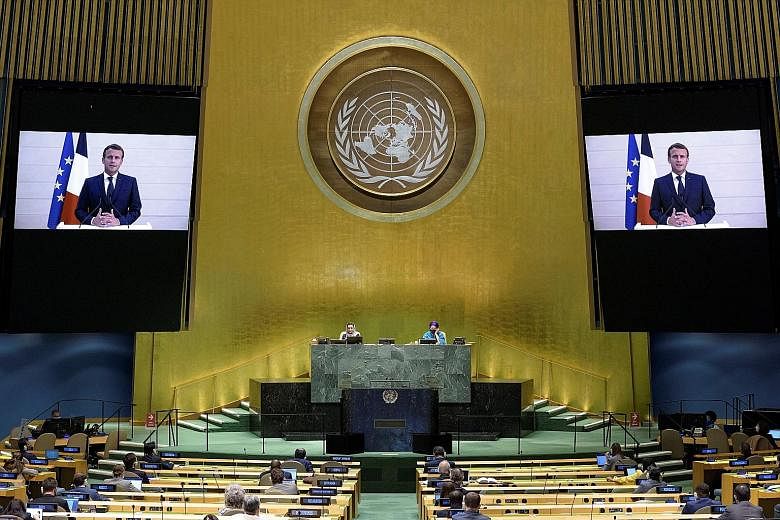UNITED NATIONS • The coronavirus pandemic must serve as an "electric shock" that wakes up the United Nations, French President Emmanuel Macron said in a speech on Tuesday that included veiled attacks on the US and China.
Mr Macron is trying to revive the multilateral order, which has been strained to breaking point by the increasingly hostile rivalry between the US and China.
US President Donald Trump's determination to redraw America's ties with the world has seen the World Trade Organisation sidelined and deals on climate change and Iran's nuclear programme called into question.
In May, he said he was withdrawing the US from the World Health Organisation (WHO) because it was unduly influenced by China.
Mr Macron on Tuesday rejected US demands for UN members to reimpose international sanctions on Iran, arguing that America had forfeited the right to trigger such measures when it withdrew from the nuclear accord in 2018.
As Mr Macron delivered his blunt assessment of the traditional world order at the annual UN General Assembly, he said people around the world had expected leaders to cooperate and find solutions to the pandemic, but that there had been a fracturing instead, in which key global bodies like the WHO were accused by some of complacency and instrumentalised by others.
"Our organisation itself ran the risk of impotency", with permanent members not able to meet at the peak of the epidemic "because two of them preferred to display their rivalry", he said in a veiled jab at the US and China.
"We can no longer be satisfied with a multilateralism of words that only allows us to agree on the lowest common denominator, a way of hiding deep divergences under a facade of consensus."
In another sign of how fractured the multilateral order has become, UN diplomats and human rights experts said US Secretary of State Mike Pompeo's recent efforts to drum up support at the UN for a new vision of human rights that prioritises religious liberty and property rights is being met with great scepticism and little support from America's European allies.
UN diplomats who spoke on condition of anonymity noted that Mr Pompeo's Commission on Unalienable Rights had drawn concern among European nations for its heavy emphasis on religion and for advancing a concept that there could be too many human rights.
Human rights scholars have noted that the panel on Mr Pompeo's commission is filled with conservatives intent on promoting views against abortion and marriage equality. Experts have said Mr Pompeo's desire to create a tiered set of human rights with some rights getting priority over others could set a global precedent for other nations looking to define human rights on their own terms.
"It exposes how out of step the US effort to unilaterally define human rights is," Duke University law professor Jayne Huckerby said.
"It's really exposing the degree to which the US has moved away from global norms."
At the General Assembly on Tuesday, Mr Trump focused his speech on attacking China.
The US President, facing a November re-election battle with his country dealing with the world's highest number of deaths and infections from the coronavirus, accused Beijing of allowing people to leave China in the early stages of the outbreak to infect the world while shutting down domestic travel.
"We must hold accountable the nation which unleashed this plague onto the world, China," he said.
China's President Xi Jinping, in contrast, struck a conciliatory tone in his pre-recorded address, calling for greater cooperation over the pandemic and stressing that Beijing has no intention of fighting "either a Cold War or a hot war with any country".
China's UN ambassador Zhang Jun rejected Mr Trump's accusations against China as "baseless" and said "lies repeated a thousand times are still lies".
UN Secretary-General Antonio Guterres, in his speech to the assembly, seemed mindful of the threats to the international body posed by the rift between the US and China.
"We are moving in a very dangerous direction," Mr Guterres said.
"Our world cannot afford a future where the two largest economies split the globe in a Great Fracture - each with its own trade and financial rules and Internet and artificial intelligence capacities."
Such a divide, he added, "risks inevitably turning into a geostrategic and military divide. We must avoid this at all costs".
BLOOMBERG, REUTERS, NYTIMES

